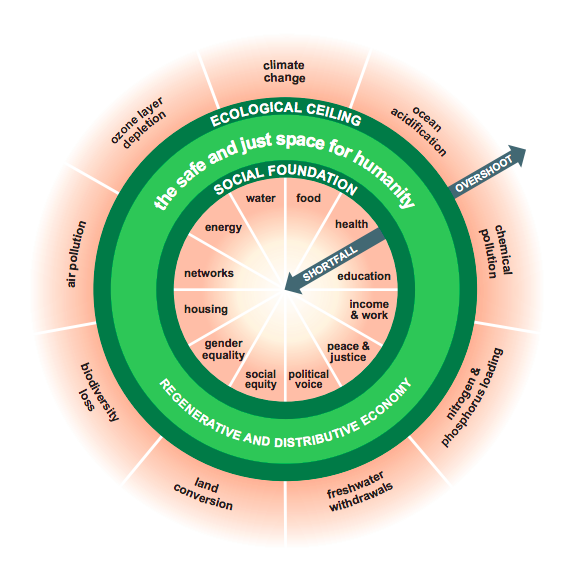Support strong Canadian climate journalism for 2025
Statistics Canada recently released its quarterly gross domestic product update. Mainstream economists, investors, bankers, businesspeople and politicians rejoiced, seeing the result as a demonstration of Canada’s strong economic health. I initially felt a surge of pride at the news that Canada appears to be doing well compared to many countries. But then I asked myself: What does GDP mean for me? Am I better off today than yesterday? Does it give any information at all about the things that matter most in life?
Over the past few months, I’ve taken to asking Canadians hanging out in coffee shops the first answer that comes to mind when thinking about the purpose of the Canadian economy. The quick answer is quite aligned with the rhetoric you hear from politicians and influential corporate leaders: GDP growth and more jobs.
I then asked those same Canadians what they aspire to as people, and you get a much more human and nuanced answer: prosperity, fulfillment, increased well-being, a healthy future for generations to come — answers aligned with Chilean economist Manfred Max Neef’s model of fundamental human needs.
Here lies the paradox: The fundamental objectives of our contemporary economic model — GDP growth and increased jobs — have become the primary policy goal of both government and private sector, but they do not align with the collective aspirations of Canadians at large.
GDP gained prominence as a tool of war in the 1940s. Its omnipotence was enshrined in 1944 when about 700 men (and, yes, they were all men) gathered in Bretton Woods, New Hampshire, to boot up the modern economic world order. Not only did these men prove that in a short amount of time you can literally change the world, they also showed how excluding diversity and different perspectives can warp a system that was supposed to enable “the pursuit of happiness” the world over. The co-inventor of GDP, Simon Kuznets, was clear in expressing its limitations, arguing that, “The welfare of a nation can scarcely be inferred from a measure of national income (domestic product).”
Unfortunately, his warning fell on deaf ears.
Numbers like GDP are not designed to say if our individual or collective well-being is increasing. But policy makers do have alternative metrics that attempt to track real progress. The Human Development Index, for instance, tracks life expectancy, education and per capita income to determine a country’s level of development.
Our economy might produce 10,000 jobs in a quarter, but are they good jobs? Are they jobs people would want if they had a choice?
It might also produce a billion dollars worth of stuff in a quarter, but is that stuff useful or helpful? Does it help meet real needs that increase happiness?
The idea of wanting our economy to "grow" in some way is not the issue. In my previous work with the UN in its pursuit of sustainable development solutions, I was often facilitating workshops and conversations on how countries could go about innovating their economic thinking. Participants — ministers, policy makers, business leaders — would often first explain how they needed “to grow their GDP” in order to achieve sustainability and equity goals. So I would ask them: “what is it, as a person, that you actually want to see grow?” The answers were never about the quantities that GDP tracks. They were more, as Robert Kennedy once expressed, all about “that which makes life worth living.”
So what can we do about it?
I have been living in Norway for over a decade and only recently returned to Canada. I am somewhat taken aback by the lack of any critique of our economic model. We seem content to hope for trickles of well-being as a side effect, rather than main objective, of our current model.
Transforming our economics is by no means easy. But it’s not a lack of knowledge of other ways of doing things that prevents change. We’ve known about progress and well-being-based approaches for more than a century. Recently, innovative thought leaders like Herman Daly and “renegade” economist Kate Raworth have brought us nature-based economics and even “doughnut economics.” All are based on the real world rather than flawed assumptions about people and an idea that infinite growth on a finite planet is possible (cue the laws of physics).

One country has pioneered an entirely different approach to economic decision-making and performance tracking. We rarely hear about it because of its rebellious dismissal of the established order of things. Bhutan applies its innovative Gross National Happiness metric to underpin its economic goals. As a Buddhist nation, they have chosen to aim for the maximization of happiness. Notice the word "chosen." They chose this approach which means any nation can choose to assign a specific purpose to their economy based on the aspirations of its people. This does not necessarily mean the Bhutanese are the happiest people in the world. But it does mean their leaders are rewarded for decisions that increase Gross National Happiness and held accountable for decisions that decrease it. In Canada, we have no way of knowing what our economy is delivering in terms of Canadians’ well-being.
Why is changing this man-made construct so challenging?
Contemporary economics exhibits similar qualities to those of a religion. We are taught that growth will be our salvation. Economic gospels reinforce these teachings. Consumption leads to happiness. Wealth trickles down to the masses (Why can’t it flow?). Unfettered private enterprise will deliver public good. There are promises of rewards for the devout while those who dare challenge the faith are branded heretics. This has led Canada and the broader global community to adopt a growth-at-all-costs dogma, stifling even the mere whisper of innovation.
In this belief system, life affecting challenges like climate change, chemical pollution, or the loss of animals are painted as technical failings that turn actions like emitting CO2, generating waste and species extinction into a reality we have to live with. In fact, this is all caused by a set of economic equations that value aspirations for happiness, the right to a healthy environment and a stable climate less than the financial reward generated by polluting activities. In other words, economic equations that were not designed to include people and planet!
This outdated thinking can change. The “GDP growth-first” obsession is a law of man (literally), not a law of nature.
As we struggle to understand, acknowledge and address global challenges in the 21st century, we can take comfort in knowing that many pioneering economists — such as E. F. Schumacher, Peter Victor, and Ann Pettitfor — have worked to integrate well-being and the natural world’s limits into mainstream economic thought.
So where to from here?
People in Canada have been gifted a creative opportunity, born out of a flawed economic theory disconnected from our deepest aspirations. Whereas today, the majority of Canadians serve a system that has no real purpose, we now have the necessary ingredients to design a system that unleashes our full potential — a system that serves our diversity and delivers what we really want out of life.
It is important for us to notice the deficiencies in the old stories in order to allow ourselves to write a new story and anchor our actions in a new narrative. Moving beyond our obsession with “GDP growth” can open up vast new horizons. We could, if we chose, be the first G7 country to change its "G for growth" to perhaps a "WE" for "well-being economy." Imagine what a new economic powerhouse a "WE-Can" could be as part of a "WE7" and beyond.
As with all belief systems, change first requires a deep awareness. As we come to understand the limitations and history of old economics, we can become empowered to imagine and enable new ways. Once we become fully aware of the simple steps it took to get us to where we are today, we become empowered to innovate in bold new directions. Once we acknowledge the power of a number like GDP and its capacity to displace our real aspirations, we can elevate new numbers that will use that same capacity to guide us to horizons of well-being, real prosperity and the natural wealth we entirely depend on.
We can all be economic artists contributing to a 21st Century canvas.





Comments
Change can come slowly, incrementally or it can come quickly, catastrophically. We are on the first course in our current practice, but we don't decide when the second course will come.